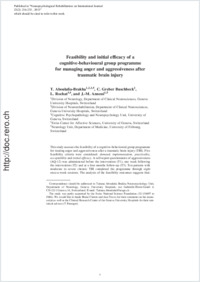Feasibility and initial efficacy of a cognitive-behavioural group programme for managing anger and aggressiveness after traumatic brain injury
- Aboulafia-Brakha, Tatiana Division of Neurology, Department of Clinical Neurosciences, Geneva University Hospitals,Switzerland - Division of Neurorehabilitation, Department of Clinical Neurosciences, Geneva University Hospitals, Switzerland - Cognitive Psychopathology and Neuropsychology Unit, University of Geneva, Switzerland - Neurology Unit, Department of Medicine, University of Fribourg, Switzerland
- Buschbeck, C. Greber Division of Neurorehabilitation, Department of Clinical Neurosciences, Geneva University Hospitals, Switzerland
- Rochat, L. Cognitive Psychopathology and Neuropsychology Unit, University of Geneva, Switzerland - Swiss Center for Affective Sciences, University of Geneva, Switzerland
- Annoni, Jean-Marie Division of Neurology, Department of Clinical Neurosciences, Geneva University Hospitals,Switzerland - Neurology Unit, Department of Medicine, University of Fribourg, Switzerland
-
24.12.2013
Published in:
- Neuropsychological Rehabilitation: An International Journal. - 2013, vol. 23, no. 2, p. 216-233
English
This study assesses the feasibility of a cognitive-behavioural group programme for treating anger and aggressiveness after a traumatic brain injury (TBI). Five feasibility criteria were considered: demand, implementation, practicality, acceptability and initial efficacy. A self-report questionnaire of aggressiveness (AQ-12) was administered before the intervention (T1), one week following the intervention (T2) and at a four months follow-up (T3). Ten patients with moderate to severe chronic TBI completed the programme through eight once-a-week sessions. The analysis of the feasibility outcomes suggests that: (1) The recruitment, the process of grouping participants and the characterisation of anger and aggressiveness at baseline need to be re-evaluated and improved for future designs. (2) The use of specific strategies for bypassing cognitive and other behavioural dysfunctions related to TBI is crucial for the success of this intervention and merits special attention. (3) The high retention rate, the convenient meeting schedule, cost advantages and the good acceptability by participants are positive arguments for the implementation of a larger trial. (4) The significant reduction of AQ-12 scores at T3 and the high effect size constitute a change in the expected direction and support the initial efficacy of the programme.
- Faculty
- Faculté des sciences et de médecine
- Department
- Médecine 3ème année
- Language
-
- English
- Classification
- Biological sciences
- License
- License undefined
- Identifiers
-
- RERO DOC 31888
- DOI 10.1080/09602011.2012.747443
- Persistent URL
- https://folia.unifr.ch/unifr/documents/302919
Statistics
Document views: 66
File downloads:
- ann_fie.pdf: 260
